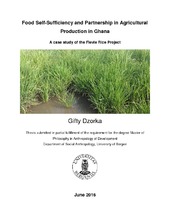| dc.description.abstract | Abstract Poverty eradication and food security issues are central to most international development policies and developing countries including Ghana. International and national policies encourage investments in the agricultural sector, as a major means to reduce poverty and ensure food security. Lands in Sub-Saharan Africa have been declared empty and unutilized, which makes Africa the best corridor for such agricultural investments. However, large tracts of land acquisition through outright sale or long term lease with little or no compensation is in turn generating tension and conflicts at the local contexts where such agricultural projects take place. The central focus of this study is to explore how partnership between foreign investors and community members affects agricultural productivity and its implications for food self-sufficiency at the national and local contexts in Ghana. The trajectory of most of the agricultural investment projects have ended in tragedy due to lack of a good working relationship between land owners and users on the one side, and investors on the other side. Some of these investments also have international market targets (biofuel production) and do not benefit the local people directly. Using the Fievie rice project as a case study, my fieldwork reveals that, the community used its land as a tool to enter into partnership with the investor company (Global Agric-Development Company). The community is entitled to 2.5% of the gross income of the project and reserves the right to take back the land within three months of non-production. An out-grower programme has been developed for some community members. However, there is a shift in attention from the main staple crop (maize) to rice production for the participants. Also, labourers of the rice project (with meagre wages) are abandoning their farmlands due to the time and energy demands of the project. The people are allowed to glean on the rice farm. There was enormous dietary transformation in Fievie from akple to rice. Drawing on phenomenological and political ecology approaches as tools of analysis, I argue that, the Fievie rice participatory project, only works to an extent and to the advantage of people with power and the affluent in the global structure, at the detriment of the less advantaged. Also, local people's interests, meaning and values ascribed to food were not considered, prior to the commencement of the project. Although rice has become available to the people, it is transforming their culturally significative diet; akple. Additionally, the rice project might have boosted national food security, however, it is at the same time generating, maintaining and improving [existing] social, economic and political inequalities within the local structure. It further works to cripple existing self-reliance efforts of subsistence farmers. I argue that, the Fievie partnership is significant in controlling conflicts and land grabs, yet, it is a novel configuration of capitalism, and not a suitable tool for development. | en_US |
